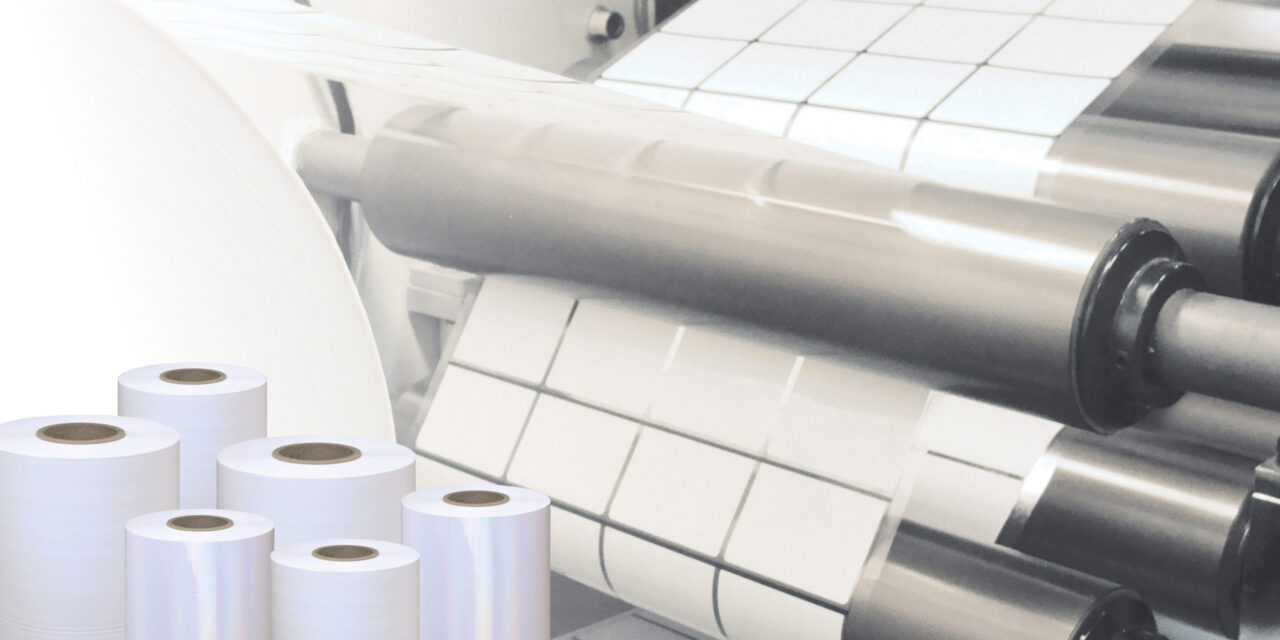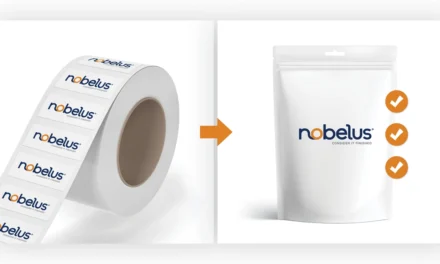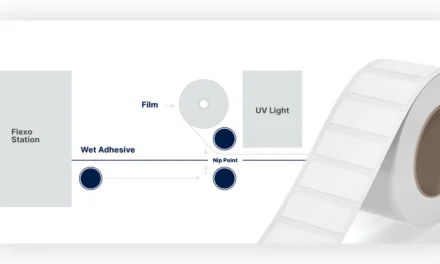Prime Label Converters Partner With Nobelus
In an age of uncertainty and constant change, prime label producers are feeling the effects of increased material costs, labor shortages, and unprecedented transportation issues. At the same time, it’s hard to justify pausing the presses to trial run solutions that may not show concrete returns. Options can seem especially limited in post-press processes, such as lamination. Self-wound laminates are popular, but they’re expensive, completely standardized, and vastly limit the finishes and overprint varnishes (OPV) labels can receive.
Nobelus is seeking to enhance the label lamination process with our line of unsupported films, specifically designed for prime labels. By separating our world-class films from their traditional thermal EVA adhesive, we’ve created a way to supply prime label converters with a variety of finishes at a fraction of the cost of self-wound laminates using their existing flexographic presses. Wet lamination is often passed over in favor of self-wound rolls due to the latter’s relative simplicity. However, Nobelus has successfully combined the cost efficiency of wet lamination with the ease of use and consistent results of self-wound laminates.
What Is Wet Lamination?
Unlike self-wound lamination methods, which include a pressure-sensitive adhesive on the film roll, wet lamination applies an adhesive to facestock immediately before the laminate is introduced. Liquid adhesive is poured into the final station in a flexopress so that after the facestock has received its printed design through ink, the surface gets coated in the adhesive. The unsupported film is pulled in at the nip roller, where it gets pressed evenly against the adhesive-coated facestock. Next, the laminated labels receive UV or LED curing to solidify the bond between laminate and facestock. This process is less expensive than self-wound lamination and fits seamlessly into a flexographic press. So why isn’t it more popular?
Old Method, New Approach
In the past, label converters who used wet lamination discovered their film suppliers lacked the customer care and material knowledge to provide guidance on which films could accept specific adhesives, leading to an endless cycle of redirection and unhelpful half-answers. Nobelus has always set itself apart from other laminate suppliers by owning the performance of our films. We partner with general commercial printers and experts in the industry to discover personalized answers to individual needs, and now we are providing that same dedicated service to prime label converters.
To keep things simple for our customers, Nobelus has collaborated with adhesive formulating facilities to conduct extensive testing concerning which adhesives work with our films so label producers don’t have to. Long before an order is placed, our representatives can provide converters with detailed information about which films and adhesives work best with each other and specific inks. Our industry experts will continue providing consultation as needed until a project is completed. We’ve done all the work behind the scenes to ensure our customers can focus on what they do best: creating incredible labels that make products pop.
Why Switch to Wet Lam?
We understand that moving to wet lamination requires a degree of faith. However, this process is completely compatible with modern UV or LED flexographic presses; no attachments or hired hands are needed. Even for water-based presses that may require the addition of a UV curing system, the benefits outweigh the risk by an impressive margin, and the payoff lasts indefinitely.
- It’s cost effective. Self-wound laminates incur a hidden processing fee because the adhesive is applied pre-press. By purchasing Nobelus’ films and a certified compatible adhesive separately, converters can eliminate convenience fees with minimal demands on their own workflow. Time may be money, but once an adhesive is introduced into the last station in a flexopress, the only additional labor cost lies in cleaning out the tray, which can be accomplished in 20 to 40 minutes a week. This adds up to major savings on materials with a negligible time commitment.
- It’s versatile. Gloss and matte are staples in the label industry, and Nobelus is fully equipped to provide these tried-and-true options for any label converter who want the same performance for reduced cost. However, label printers who want to expand their offerings and reach new markets will find a host of specialty finishes previously unseen in the label industry. Since our films contain no adhesive when shipped, the coatings and treatments that prevent film from sticking to the roll aren’t necessary, opening the door to velvety soft textures, eco-friendly cellulose, and holographic effects that shimmer on the shelf. Our films also accept a wide range of OPV, enabling prime label converters to target luxury markets and complement existing branding.
- It’s simple. Load the unsupported film roll, add adhesive to the final flexopress station, and start printing. The rest of the process remains the same as self-wound lamination. Nobelus can give recommendations concerning adhesives when film is purchased, so the mental labor of planning which materials need to be ordered is comparable to ordering a single self-wound roll. When the presses stop for the day, the adhesive can be covered and left at rest in the deck without risk of curing or solidifying, meaning no prep work is necessary between identical runs.
Whether the goal is to save money or make money (or both), Nobelus can meet converters where they are. Still, our business model focuses on much more than making a sale.
Service Doesn’t Stop With an Order Confirmation
Nobelus is more than a supplier. We serve as an advisor to prime label converters at every post-press stage to ensure each label reaches its full potential. Our qualified team members are ready to aid in a range of areas.
Our dedicated representatives understand that when our clients succeed, Nobelus succeeds. They work tirelessly to ensure each account gets the attention and care it deserves and can network with industry allies in a range of fields to discover unique approaches that solve specific problems.
Our strategic solutions managers have decades of experience with labels and understand the industry inside and out. Their consultation and expertise can equip converters to make the leap from self-wound to wet lam by addressing any questions or concerns.
From the Mark Andy 2200 to the most niche model on the market, Nobelus’ trained in-house technicians can provide comprehensive support through phone calls or on-site visits. Their familiarity with a variety of equipment enables them to pinpoint problems and find quick solutions to keep the presses running.
We provide converters with the resources they need to implement brand alignment for their products across a variety of packaging types, from folding cartons to flexible packaging. The ability to seamlessly integrate a label into existing product lines positions manufacturers to become key players across several industries.
Ready to Get Started?
Nobelus is excited to learn about your operation’s specific needs and goals. If you have questions, our representatives are ready to walk you through the process and connect you with our in-house experts. Whether you want to save money, make money, or leave your mark in specialty markets looking for creative prime labels, we’d love to be part of the process.



